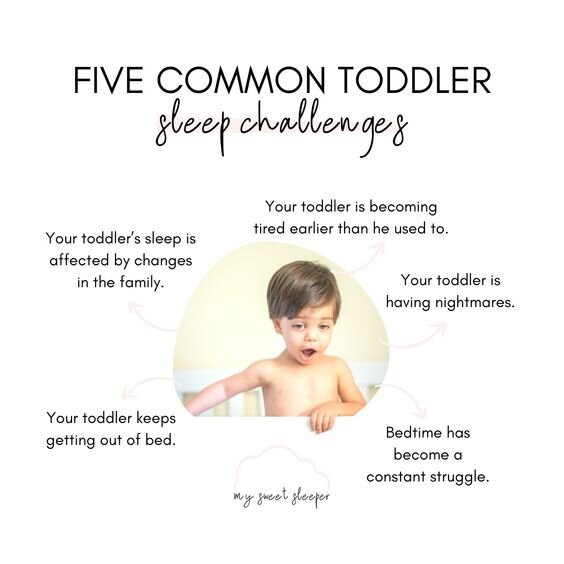Five toddler sleep challenges to expect & what to do about them
Life with a toddler is definitely an adventure. From potty training to picky eating and tantrum managing, every day can present a new challenge. And just when you’ve gotten used to a few months of not being interrupted from your 8-hours sleep at night, your toddler decides to start waking up again at 3am. Sleep regression doesn’t only happen to newborns - it can still happen in toddler-hood (just what you were hoping to hear).
But listen - before you start pouring another cup of coffee, know that these toddler sleep issues are actually predictable habits, and there are tools and tricks that can help you manage these transitions with ease.
Here are five toddler sleep issues to expect and what to do about them:
1. Your toddler keeps getting out of bed.
Toddlers love to be active, and bedtime is no exception. If your kid is always getting out of bed after being put down for the night, here are a few things you can try:
Tell your toddler your expectations of how often he is allowed to come out of his room at night. As a gradual transition, you can allow him to have a “pass” once or twice a night so he knows that he can come to you. But after those one or two, he should know that he needs to stay in bed until morning.
There are many toddler alarm clocks (here’s our favorites!) that you can buy where there is a light that turns red/yellow/green at specific times (which you set) to let your child know when they are allowed to get up for the day.
If your toddler continues to get up throughout the night, you may have to just keep walking her back to bed. It may feel like you are doing this 27 times a night, but after enough consistency, she will understand the boundary. Be consistent - don’t sometimes let her in bed with you and sometimes not.
2. Your toddler is becoming tired earlier than he used to.
Your toddler may be transitioning from two naps to one, or maybe dropping his nap completely. Daytime sleep and nighttime sleep often affect each other, so if there is a shift in daytime sleep, it could certainly affect the nighttime. If this is the case, the best thing to do is move bedtime forward so that he doesn’t become overtired. Also make sure to give plenty of wind-down time before bedtime.
3. Your toddler is having nightmares.
Since children’s imaginations develop at this age, nightmares are very common. As they see more of the world, they are stimulated as the day goes by. The best way to help your child through this is to make sure he feels safe. You can introduce a lovely or a photo of you in his room - anything he can hold to feel safe. The day after a nightmare, try talking about it with your toddler to see if there’s anything that may have caused it, or have them draw it out. Regardless, just focus on giving your little one the comfort he needs and help him get back to sleep.
4. Bedtime has become a constant struggle.
Children can experience all different kinds of emotions when it is time for bed, including fear, separation anxiety, or even anger - and sometimes these can cause tantrums. Instead of focusing on teaching discipline during these outbursts, use the chance to teach and enforce boundaries. Teach your toddler the bedtime routines, and communicate them clearly and consistently. For example, you could say things like, “We want to get a good night’s sleep tonight so we have enough energy to have fun at the pool tomorrow.” or “We won’t be able to go to the birthday party tomorrow if all of us don’t get the sleep we need tonight. Can you make sure that doesn’t happen?”
5. Your toddler’s sleep is affected by changes in the family.
Maybe you had a new baby. Maybe you moved into a new house. Whatever the change is, your toddler can feel the effects and it will most likely impact her sleep. She might wake-up earlier than preferred in the morning, or have trouble sleeping through the night. If this is the case, try to keep your routine as consistent as you can, but also give her a little extra tender loving care. Although it may be tough at the time, when she starts to feel more settled and comfortable, her sleep habits will go back to normal.
Although this season of life can be a challenge, the more you stay consistent with sleep boundaries, the better chance your toddler has to learning healthy sleep habits that stay.
Feel free to contact us for guidance or try our toddler sleep course.
Related:
5 toddler sleep milestones to be prepared for
Tips for siblings sharing a room
Ways to overcome the bedtime battle
How & when to transition to a toddler bed
Is separation anxiety the cause of your child’s sleep issues?

